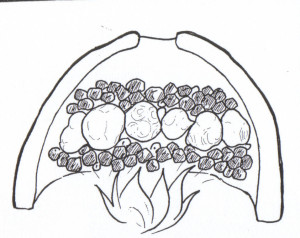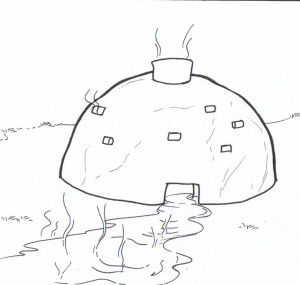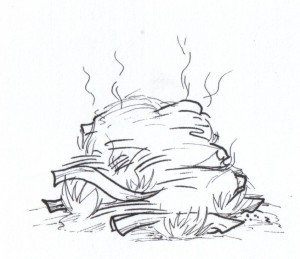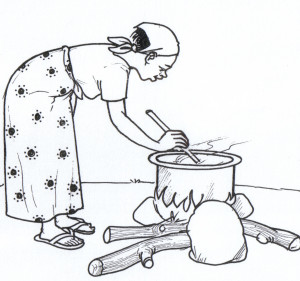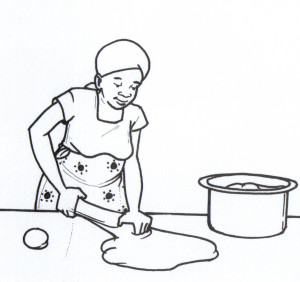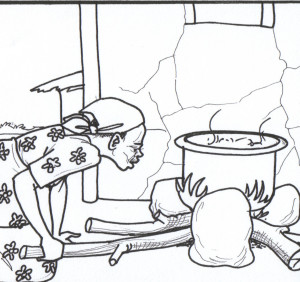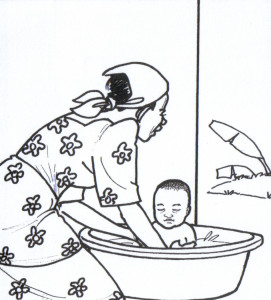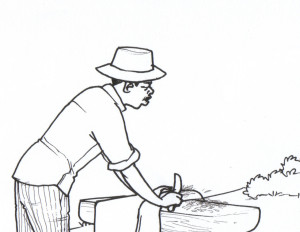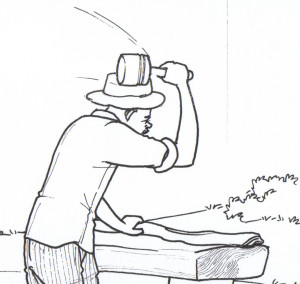Households make up the most important market segment in an economy. Among the things bought by households include items such as plates, cups, knives, spoons, etc. Below are useful lessons to inspire you into a career or a business of providing household items.
(b) The Science Behind
-Heating iron ore above a certain temperature (melting point) changes it from a solid state into a liquid state.
-When in a liquid state, iron ore can be molded into all kinds of iron-products.
(c) Challenge for present Uganda
Uganda is yet to add value to the abundant resources nature has endowed it with.
(d) What you need to think about
(i) Have you ever seen a product on the market made by local artisans, say those in Katwe area in Kampala?
(ii) How do these products look in terms of quality?
(iii) What do you think can be done in order to improve the quality of products from local artisans in Uganda?
(iv) Who may be responsible for solution(s) you mention in (iii) above?
(v) Can you become an advocate of the solution(s) you mention in (iii) above?
(b) The Science Behind
-Burning of rotting banana stems was a way of obtaining sodium hydroxide (NaoH).
-Sodium hydroxide precipitates soap out of melted fats.
(c) Challenge for present Uganda
It is possible to obtain several requirements (inputs) for school science practicals from locally available materials.
(d) What you to think about
(i) Have you ever participated in a physics or chemistry practical at school?
(ii) If yes, of all the things you used in that practical, which ones were made from Uganda?
(iii) Did you know that in order to import those requirements for practicals, government spends money it would use to buy medicines for hospitals, build more schools, buy text books, etc.?
(iv) Can we locally produce some of the things used for school practicals in Uganda?
(v) If yes, how can it be achieved?
(vi) Your answer in (v) above, if its right, implies an opportunity to make money.
(b) The Science Behind
-Boiling herbs releases a variety of natural compounds and other substances into water.
-Some of these substances are medicinal, protecting the baby against skin infections or indirectly strengthening the baby’s body defense system.
(c) Challenge for present Uganda
If these herbs had been harmful to the newly born ones, they would have been abandoned long ago. Similarly, if they offered no benefit at all to the baby, they would have been abandoned long ago. That said, there is need to do research and establish the actual health benefit of these herbal-baths.
(d) What you need to think about
(i) Did you know that many babies develop rashes and other skin infections?
(ii) Did you also know that many mothers in Uganda claim that babies bathed in local herbs maintain good skin and suffer less from skin infections? How can we find out whether what these mothers are saying is true or not?
(iii) Have you ever suffered a skin infection?
(iv) If yes, was it easy to treat?
(v) What should people do to avoid or minimize getting skin infections?
(b) The Science Behind
-Fig trees produce an impressive fibrous texture in their bark. At the same time, the bark of a fig tree separates easily from the trunk. Thus, bark cloth making was essentially an art of freeing the fibrous texture from the rest of the bark. The beatings and sun treatments were however important discoveries in bark cloth making.
(c) Implication for Present Day Uganda
Bark cloth is still relevant; it can be used in making ecologically-friendly hats, bags and other craft. All these help in promoting and sustaining the tourism industry in Uganda.
(d) What you need to think about
(i) What is tourism?
(ii) Did you know that students like you can become tourists in Uganda?
(iii) If yes, can you interest your school or school club into visiting historical places, museums, national parks, etc. in Uganda?
(iv) Did you know that Uganda can earn far more money from tourism than from oil?
(v) If yes, what is making Uganda earn little money from tourism?
(vi) How can your generation help in overcoming the obstacles failing Uganda’s tourism?
(vii) Can you be part in your generation who will put right Uganda’s tourism?
Becoming a wealthy Person in Uganda
Uganda is blessed with numerous natural resources, many of which can be turned into products or services for households in the country and beyond. Turning these resources into products or services of value to man presents many opportunities for job creation or for starting a business. If you feel an interest in starting a business, then look carefully for any of these opportunities. The subsections “What you need to consider”, previous page, may provide you a staring point. If you detect an opportunity, and it sounds interesting to you, take it up as follows:
i. Write it down on paper.
ii. Revisit it after a week and see if it still makes sense.
iii. If the idea still makes sense, get more information about it, especially through reading.
iv. Use the new information to refine your idea (make it clearer).
v. Keep it for an appropriate time.
In other words, you can seize the opportunity while still at school, then turn it into business after you have completed school or during your long school holidays. This is one of the shortest paths before you towards becoming wealthy in Uganda.
Becoming better and effective Person for Uganda
By reading this interesting story and changing accordingly, you will become valuable to your country’s efforts of realising a vibrant economy.
Careers relevant to production in Uganda
If you want to establish whether or not production of goods and services is an area you can work in after school, read this interesting story. Some of the careers relevant to production of goods and services in your country include:
| Careers | Description |
| Boilermaker | -Manufactures, constructs, and repairs structures of steel, plate and piping, ranging from pressure vessels for power stations and petrochemical plants, to mine head gears, bridges and oil-drilling platforms. |
| Clothing designer | -Creates and helps produce men’s, women’s, and children’s apparel, including casual wear, suits, sportswear, etc. |
| Distribution manager | -Plans and coordinates transportation, storage, and other distribution activities in accordance with governmental policies and regulations. |
| Footwear designer | – Helps create and produce different styles of shoes and boots. |
| General manager | -Responsible for the effective control and co-ordination of all facets of a company/business, and its operations. |
| Industrial designer | -Designs or improves useful consumer articles. |
| Inventory and stores manager | -Ensures that the materials and equipment are available at the right time and place, for the work to be done. |
| Knitter | -Processes cotton, wool or other similar forms of yam of natural or man-made origin into clothing, scarves or other processed or manufactured articles. |
| Machine worker | -Responsible for supervising the operation of a machine, which is used to produce satisfactory finished articles according to specifications. |
| Machinist | -Uses machine tools, such as lathes and milling machines, to produce precision metal parts. |
| Millwright | -Installs, replaces, dismantles, and repairs machinery and heavy equipment used in power generation, in manufacturing plants, at construction sites, in mining operations, etc. |
| Operations research analyst | -Helps to allocate resources, measures performance, designs production facilities and systems, manages the supply chain, sets prices, etc. |
| Production manager | -Responsible for the planning, organization, co-ordination and control of production. |
| Purchasing manager | -Ensures effective supply of raw materials, equipment, merchandise and services to an enterprise. |
| Tool, jig & die maker | -Produces and repairs tools, dies, and special guiding and holding devices that enable machines to manufacture a variety of products for daily use. |
| Quality control inspector | -Sees to it that prescribed standards are maintained in the production of motor vehicles. |
| Advertising manager | -Produces materials such as posters, coupons, or give-aways, to create extra interest in the purchase of a product or service. |
| Marketing manager | -Does research, identifies potential markets, creates marketing aids such as brochures, and plans marketing campaigns. |
| Market researcher | -Helps to determine facts concerning the consumer, the consumer’s awareness of the products or service, and the effectiveness of advertising. |
| Brand manager/product manager | -Controls policies regarding product packaging, branding, pricing, advertising, promotions and distribution. |
| Promotion manager | – Directs promotion programs that combine advertising with purchase incentives to increase sales. |
| Public relations officer | -Builds bridges of understanding between a company and the public whom it wishes to influence. |
| Salesperson/agent | -Presents a firm’s products to possible clients in such a way as to create an interest in the merchandise, and thereby promote sales. |

